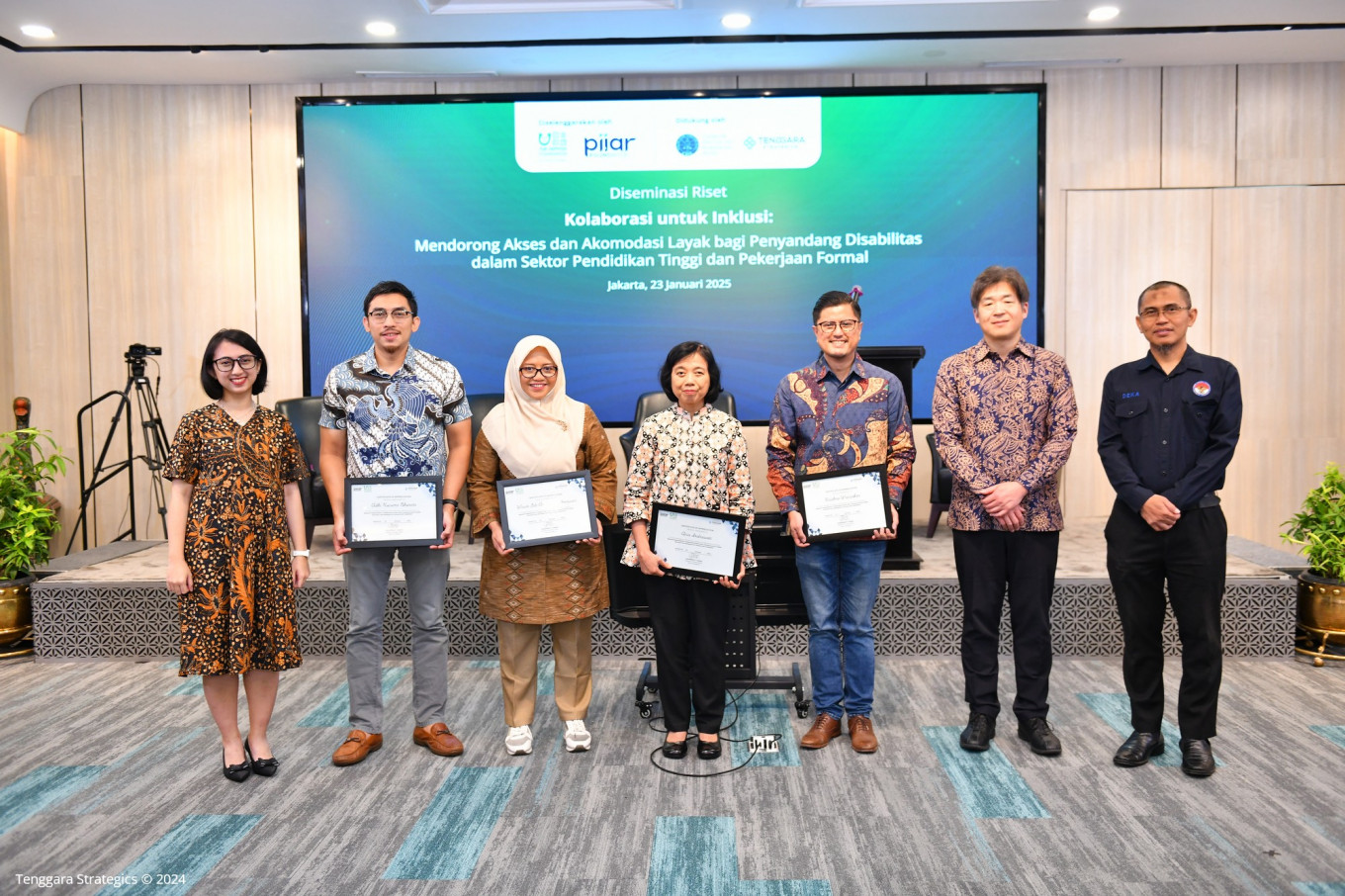Popular Reads
Top Results
Can't find what you're looking for?
View all search resultsPopular Reads
Top Results
Can't find what you're looking for?
View all search resultsNo one left behind: Embracing disability inclusion in higher education, formal employment
Change text size
Gift Premium Articles
to Anyone
 Pijar Foundation director of public policy Cazadira Fediva Tamzil (from left to right), Deaf activist Adhi Kusumo Bharoto, Nahdlatul Ulama University’s (UNU) Gender Equality, Disability, and Social Inclusion (Gedsi) director Wiwin Siti Aminah Rohmawati, Yayasan Mitra Netra public relations Aria Indrawati, Microsoft Indonesia CFO and diversity/inclusion lead Krishna Worotikan, Nippon Foundation executive director Ichiro Kabasawa, and National Commission on Disabilities deputy chairman Deka Kurniawan pose for photo during the launch of a Collaborative Action Plan to accelerate persons with disabilities inclusion in higher education and formal employment in Jakarta. (Photo by Tenggara Strategics)
Pijar Foundation director of public policy Cazadira Fediva Tamzil (from left to right), Deaf activist Adhi Kusumo Bharoto, Nahdlatul Ulama University’s (UNU) Gender Equality, Disability, and Social Inclusion (Gedsi) director Wiwin Siti Aminah Rohmawati, Yayasan Mitra Netra public relations Aria Indrawati, Microsoft Indonesia CFO and diversity/inclusion lead Krishna Worotikan, Nippon Foundation executive director Ichiro Kabasawa, and National Commission on Disabilities deputy chairman Deka Kurniawan pose for photo during the launch of a Collaborative Action Plan to accelerate persons with disabilities inclusion in higher education and formal employment in Jakarta. (Photo by Tenggara Strategics)
P
ijar Foundation and Nippon Foundation, in collaboration with Tenggara Strategics, launched a Collaborative Action Plan to accelerate the inclusion of persons with disabilities (PWDs) in higher education and formal employment. The launch event, held on January 23 at CSIS Indonesia, brought together diverse stakeholders, including representatives from disability communities, government bodies, employers, and higher education institutions.
PWDs are explicitly prioritized in the government’s Asta Cita, underscoring their significance in Indonesia’s future development. Additionally, Law No. 8 of 2016 establishes a legal framework to ensure PWDs have access to higher education and formal employment as part of the broader goal of disability inclusion to drive equitable economic growth.
“Talking about (building) a developed nation isn’t just about income or economic growth; it’s about talent and people. And when we talk about people, no one should be left behind. That’s why we’re highlighting inclusion for PWDs—because we’re all Indonesians who deserve to experience a developed Indonesia by 2045,” said Cazadira Fediva Tamzil, Pijar Foundation’s director of public policy, during her opening remarks.
The Collaborative Action Plan was developed to address the limited participation of PWDs in higher education of just 2.8% in 2022 and formal employment, where only 1% of PWDs were employed in 2023.
The document advocates for a shift in approaching disability, moving from a charity-based to a human rights-based approach. Such a shift would empower PWDs to play an active role in shaping inclusion policies, programs, and participation. To support this, stakeholders are encouraged to strengthen monitoring systems and expand the implementation of existing policies.
Aria Indrawati, from Yayasan Mitra Netra, and Adhi Kusumo Bharoto, a Deaf expert and activist, highlighted that changing perspectives from charity to human rights will take time. They emphasized the need to bridge the gap between special education schools and common schools to help PWD graduates thrive in the workplace.
“It’s not just about (higher education institutions) accepting PWDs; it’s about providing proper accommodations and full accessibility because we are talking about delivering knowledge and fostering critical thinking for students with disabilities,” Adhi remarked, adding that the spirit of inclusivity must be embedded in curricula, learning activities, and education systems.
To enhance inclusion in higher education and employment, stakeholders must work together to develop standardized guidelines. These include uniform sign language, a robust understanding of the disabilities spectrum, and fostering an inclusive academic and workplace culture.
Wiwin Siti Aminah Rohmawati, director of Gender Equality, Disability, and Social Inclusion (GEDSI) at Nahdlatul Ulama University (UNU), shared her institution’s approach to creating an inclusive campus culture. “We provide academic, emotional, and infrastructure support. Our training on gender, disability, and social inclusion isn’t just for students and lecturers but also for staff and security teams to raise awareness,” she explained.
Krishna Worotikan, CFO and diversity/inclusion lead at Microsoft Indonesia, stressed the importance of embedding inclusivity into business operations. Krishna shared how Microsoft has adapted its recruitment process to be accessible for candidates with disabilities.
“Our hiring policy ensures all roles are open to everyone. For certain disabilities, we’ve adapted interview processes, including specific guidelines for neurodiverse candidates—from interviews to hiring and training, all designed to be inclusive,” said Krishna.
He added that Microsoft guidelines for inclusivity extend beyond recruitment to encompass Microsoft’s broader ecosystem of partners.
The launch concluded with a shared commitment to advancing disability inclusion in education and employment. By uniting government, academia, businesses, and the disability community, the Collaborative Action Plan aims to lay the foundation for progress that leaves no one behind.









